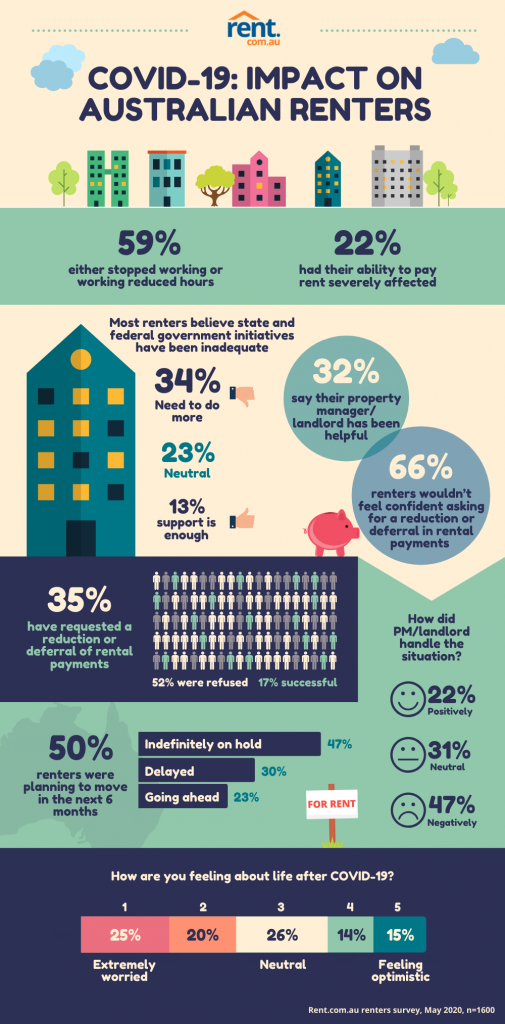The coronavirus crisis has hit Australia’s residential rental system hard. But how renters respond to the “new normal” can determine if they can overcome the challenges or not.
The economic disruptions created by the COVID-19 pandemic has brought unprecedented financial hardships to Australian workers. With many laid-off or had their work hours slashed, people have grown heavily concerned on how to meet their housing expenses.
Rental property website Rent.com.au has recently surveyed 1,600 Australian renters on how the global outbreak has affected them financially and what this meant for their future plans. The results, reflected in the infographic below, were telling.

How does the COVID-19 pandemic affect renters’ ability to pay rent?
The government lockdown drove many businesses to stop operations, almost instantly resulting in job losses or reduced work hours for many workers. In turn, this has severely affected tenants’ ability to pay rent.
The survey revealed that almost 60% of respondents were earning less due to the pandemic while a third admitted to completely losing their jobs. More than a fifth (22%) said that their ability to pay rent has been adversely impacted.
Greg Bader, chief executive officer of Rent.com.au, said that while the shutdowns have been “devastating for many businesses,” there were specific industries – such as hospitality, tourism, and retail – that were hit harder than most.
“These are also the sort of industries that typically over-index with younger staff, the largest cohort of the renting community,” said Bader.
He added that, although the federal and state governments enacted measures to support tenants during the crisis, there was still a level of confusion among renters in the terms of the relief packages.
This has led more than half (53%) of respondents to say that they would like to see more assistance from the government – with just 13% believing the support that the government has given has been enough.
“Short-term protections such as a moratorium on evictions, or a deferral in rent, provide some comfort, but there are concerns that this is just kicking the can down the road. We hope to see the industry and government respond in innovative ways to support renters and the industry-at-large,” said Bader.
“We need to understand that renters, who make up 30% of us, will continue to deal with the financial impact for months or years to come.”
How do landlords handle the COVID-19 crisis?
But while renters are faced with the difficult task of sustaining payments with reduced incomes, landlords are also under financial pressure to keep their loan repayments covered. This position can lead to a measure of distrust between tenants and landlords.
According to survey, two-thirds of renters do not feel confident in asking their landlords or property managers for help. Only 32% said that their landlords were supportive during the crisis.
Bader emphasised the importance of communication during these uncertain times and urged landlords and property owners to check on their tenants.
“Open and honest communication is the key and can only be an advantage for all parties as we prepare for the months ahead,” he said.
However, the survey revealed that not all renters were seeking financial assistance as only 35% of respondents have asked owners for a payment reduction or deferral. Unfortunately, more than half or 52% of those who did were rejected.
“Obviously, every case is different, and the renter will generally be required to demonstrate any impact on their income/affordability,” Bader said.
“Property managers and landlords are also affected by the crisis and all of us are navigating new ground. So once again, open communication is important, with both parties needing to be empathic and understanding of each other’s situation.”
What are renters’ plans post-pandemic?
The pandemic has also thrown a wrench in the plans of many renters’ to move into new properties.
According to the survey, half of the respondents had plans of moving in the next six months. However, 47% of that group have put moving on plans on hold indefinitely while 30% said their plans will have to be delayed because of the pandemic.
Bader said this was not surprising given the economic uncertainty during these times.
“With record levels of rental properties available right now and the possibility of downward pressure on rents, there is even more incentive for landlords and property managers to negotiate with their tenants, because finding a new one will be a little harder,” he said.
However, Bader said that his firm have seen “some positive sentiment returning to the market” in the past weeks. He said activity in their platform – such as traffic, renter resumes and property enquiries – have been increasing compared to a month ago.
Some renters have begun to see light at the end of the tunnel, with about 30% of those surveyed said they were optimistic about life after the COVID-19 pandemic, especially with restrictions slowly starting to ease.
“That’s a good sign for us as a community, and we hope to see that grow over the next few months, as the economy re-opens and renters get a little more security. In the meantime, we encourage renters and property managers to stay connected,” said Bader.